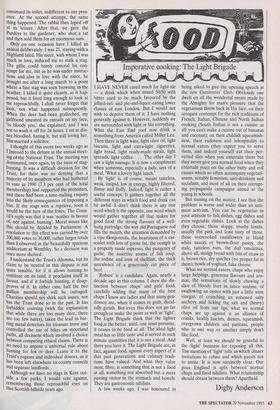Imperative cooking: The Light Brigade
I HAVE NEVER cared much for light ale — a drink which when mixed 50/50 with bitter used to be much favoured by the jellied-eel- and pie-and-liquor-eating lower classes of east London. But I would not wish to deprive them of it. I have nothing generally against it. However, suddenly we are surrounded with light or lite everything. What the East End yoof now drink is something from America called Miller Lite, Then there is light wine, light olive oil, light biscuits, light and extra-light cigarettes, light bread, light ready-made meals, light spreads, light coffee. . . . The other day I saw a light sausage. It is now a compliment when someone, especially a lady, says of a meal, 'What a lovely light lunch.'
By 'light' is, of course, meant tasteless, weak, insipid, low in energy, highly filtered, flimsy and fluffy. Indeed, light is rather a useful concept. It gathers together all the different ways in which food and drink can be awful. I don't think there is any one word which is the opposite, one word which would gather together all that makes for good food: the strong flavours of a well- hung partridge, the way old Portuguese red fills the mouth, the attention demanded by a ripe Gorgonzola, the heartiness of a cas- soulet with lots of goose fat, the oomph in a properly made espresso, the pungency of garlic, the assertive aroma of fish soup, the iodine and iron of shellfish, the thick succulence of a generously cut piece of beef... .
`Robust' is a candidate. Again, nearly a decade ago in this column, I drew the dis- tinction between chaps' and girls' food, carefully adding that many of the best chaps I know are ladies and that many gen- tlemen are, when it comes to grub, decid- edly girlish. But even this does not go far enough or make the point as well as 'light'. The Light Brigade think that the lighter food is the better, until, one must presume, it ceases to be food at all. The ideal light meal has so little taste and is served in such minute quantities that it is not a meal. And there you have it. The Light Brigade are, in fact, against food, against every aspect of it that past generations and culinary tradi- tions have valued. And what they value most, fibre, is something that is not a food at all, something not absorbed but a mere passing visitor in the stomach and bowels. They are gastronomic nihilists.
A few weeks ago, I was honoured in being asked to give the opening speech at the new Carnivores' Club. Obviously one dwelt on all the wonderful meats made by the Almighty for man's pleasure that the vegetarians throw back in His face; on their arrogant contempt for the rich traditions of French, Italian, Chinese and North Indian cooking (South Indian is not a cuisine at all: you can't make a cuisine out of bananas and coconut); on their childish squeamish- ness, their rudeness and inhospitality to normal eaters (they expect you to serve them, and indeed yourself eat their per- verted diet when you entertain them but they never give you normal food when they entertain you); on the other batty and evil causes which so often accompany vegetari- anism, notably feminism, anti-drinkism and socialism; and most of all on their corrupt- ing propaganda campaigns aimed at the young in schools.
But musing on the matter, I see that the problem is worse and wider than an anti- meat activism. You can be vegetarian in your attitude to fish dishes, egg dishes and even vegetable dishes. Look at the dishes they choose, those sloppy, mushy lentils, usually the pink and least tasty of those, those overcooked cauliflowers in bland white sauces or brown-flour pastry, the stale, tasteless nuts, the dull omelettes, above all, stodgy bread with bits of straw in it, brown rice, dry quiches (no proper fat in them), bowls of yoghurt, fake cheese.
What we normal eaters, chaps who enjoy large helpings, generous flavours and aro- mas, the sensations of slowly chewing a slice of bloody liver in sauce soubise, of swallowing an oyster with just a little wine vinegar, of crunching an unboned salty anchovy and licking the salt and (heavy) olive oil from our lips, what we normal chaps are up against is an alliance of cranks, health fascists, dieters, squeamish, overgrown children and puritans, people who in one way or another simply don't like food.
Well, at least we should be grateful to the 'light' business for exposing all this. The mention of 'light' tells us which dinner invitations to refuse and which guests not to invite. It is now succinctly clear. Our poor England is split between "normal chaps and food nihilists. What relationship should obtain between them? Apartheid.
Digby Anderson










































































 Previous page
Previous page